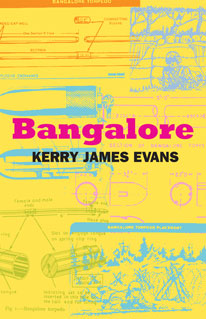Review of: Bangalore, by Kerry James Evans
Review of Bangalore, by Kerry James Evans
Copper Canyon, 2013: $16.00 paperback
The debut collection of poems Bangalore by Kerry James Evans is a beautifully constructed book. It’s a bit bulky and oversized (6 x 9 inches) so it sticks out on the bookshelf, and it’s nice to see a book of poems built with consideration for the poems inside. The construction lets the lines run as far as Evans originally envisioned, and he does extend them as far as he can across the page. Take the second poem in the book, “An Instance of Love,” which establishes far more than just the formal concerns he’s after. It starts:
“Reader, it doesn’t matter what you think happened to those wheat fields
reaped by the slow
threshing of steel.”
By demolishing the fourth wall and addressing the reader directly, Evans achieves a level of intimacy with his audience that many poets would prefer to avoid at all costs. And even if this intimacy is only a gesture, it gives him the freedom to take risks, to be himself, and to offer up each fragmented stanzas and disjointed image: “the multicolored/ ball pit/ of ketchup and syringes.” The images Evans offers seem to exist both literally and figuratively—as lucid and untenable as the memory that created them—and the more they build up inside these broken and sprawled out stanzas, the more I found myself as a reader implicated:
“You and I have harvested nothing more than the stench
of middle age,
dropped here by a stopwatch
and a bottle of Gatorade.”
His poems are as varied as any book of poetry and include such things as: a frozen peach, a ’66 Falcon, a red wagon, some Kudzu, some Alabama, a pinch of Rome, rotting blackberries, a game of Monopoly, an elephant on Silk Road, and a Persian rug. But Evans is after more than building a catalogue of objects and images. Evans is after love and anger and class and identity, and he’s not afraid to spell things out (in jarringly flat declarations) for the reader who’s only going through the motions, who’s reading at an emotional distance and trying to remain unaffected. Here are just a few of the assertion he makes:
“You cannot escape your family,”
~from “Soldier’s Apology”
“I do not belong here.”
~from “A Treatise on Violence”
“We will all be driven back to the sea.”
~from “Seven Chants, A War Cry”
Each statement is part confession and part affirmation, and they are, at their core, examples of a larger strategy behind his poems. His speaker is reaching out, again and again, trying to communicate as plainly as he can. Evans is masterful at challenging his readers to be better readers, at keeping them invested in the poems and the implications behind them, and with each lyrical turn of phrase or declarative statement he’s turning the screws tighter and tighter.
Bangalore is a powerful first offering from a poet who’s clearly got more coming our way, and its bright yellow spine looks especially unique on the shelf, sticking out from the smaller, blander, more conservative books of poetry out there.
—TM
